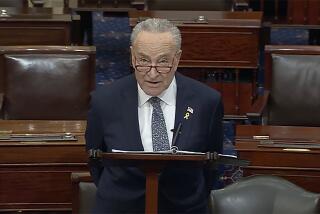Can’t Expect Swift End to Arab Uprising, Jerusalem Mayor Says
- Share via
Jerusalem Mayor Teddy Kollek made clear Thursday that he has little patience with American Jews pressing Israel to negotiate with the Palestine Liberation Organization for a quick solution to the violence in the occupied territories of the West Bank and Gaza Strip.
In fact, it is unrealistic to expect a swift resolution to the daily confrontation between the Israeli army and the Palestinians, according to the popular politician, who has attempted to foster a tolerant city where Jews and Arabs can co-exist.
Just last month, 200 American Jews urged in a statement that Israeli Prime Minister Yitzhak Shamir begin negotiations with the PLO in an effort to end the violence. Signers included director Woody Allen and novelist Philip Roth.
Some ‘Have a Right’
“Jews who have supported us for the past 20 or 30 years have a right to criticize us,” Kollek, who turns 78 on Saturday, said in an interview while visiting Los Angeles.
But as for Allen and Roth, Kollek suggested that they were taking a cheap shot. “They are absolutely irrelevant to Jewish life” in Israel, he said.
On the whole, Kollek said, it is his sense that public opinion among American Jews has not substantially hardened against Israel despite the violence in the territories. “American Jews are saying, ‘It’s their (Israelis’) business; you have to decide’ ” how to handle the conflict, he said.
The PLO’s charter still calls for the destruction of Israel, he noted. Therefore, he said, it is more logical to look forward to talking with elected representatives of the 1.7 million Palestinians living in the occupied territories. The elections are a key part of Shamir’s current peace proposal for the conflict.
“The whole idea of elections is being promoted,” said Kollek.
Election Plan Approved
Over the objections of right-wing legislators, an election plan for Palestinians living in the occupied territories was approved last week by the Knesset, Israel’s Parliament. But no election timetable was immediately set forth.
Kollek said it is his hope that the election can be held later this year, followed by a “five-year cooling-off period. And what will happen after that, nobody knows at this point.”
One factor that might accelerate the election’s timetable, he said, is the restlessness of the Israeli army, daily confronting the Palestinians in the territories.
“The Israeli army is anxious to pull out,” he said. “We do not want to rule another people. We are interested in our own security.”
As for Jerusalem--where last February he won his sixth straight term as mayor but for the first time lost his majority on the City Council--Kollek said the violence that has permeated the territories has not carried over to his city, which is populated by 350,000 Jews and 150,000 Arabs.
“We have in Jerusalem a comparatively quiet situation,” he said, noting that there were only four homicides last year linked to Arab terrorism.
One reason for this, he said in a recent article in the U.S. periodical Foreign Affairs, is that in Jerusalem “the same government and municipal regulations apply to Arabs and Jews alike. . . . It is not a question of equal rights but a question of good will and a question of time--and the Arabs and the other minorities know it, even if they sometimes suffer unjustly and impatiently.”
Is a seventh term in the cards for Kollek? No, he said.
“I can’t see myself running for another election at the age of 83.”
More to Read
Sign up for Essential California
The most important California stories and recommendations in your inbox every morning.
You may occasionally receive promotional content from the Los Angeles Times.













